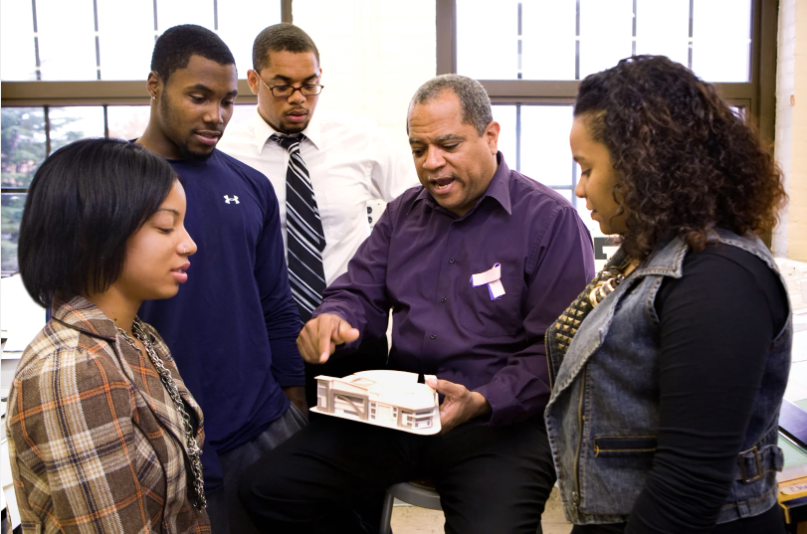
Virginia member and immediate past president of the Board of Directors, Robert L. Easter, FAIA, has been awarded the 2023 Whitney M. Young Jr. Award by the American Institute of Architects. The award distinguishes an architect or architectural organization that embodies social responsibility and actively addresses a relevant issue, such as affordable housing, inclusiveness, or universal access. The Whitney M. Young Jr. Award is named for the civil rights activist who called out the lack of diversity in the profession and its silence on key issues during his 1968 address at the AIA annual convention. His remarks set in motion a series of initiatives intended to respond to his challenge.
From the AIA’s announcement:
“Through his staunch advocacy and commitment to education, Robert L. Easter, FAIA, has continually proven himself to be a leader for all members of the profession who embody architecture’s progressive values and seek to shape our world for the better. Equally active in practice and the academy, Easter has embodied Whitney M. Young Jr.’s famous 1967 call to action, and he has worked tirelessly to ensure the profession becomes much more diverse and inclusive than he once found it.
Easter’s work to broaden diversity, equity, and inclusion began early in his career while he was a student at Virginia Tech. As a graduate student, he was instrumental in advancing a minority lecture series that introduced an overwhelmingly white design academy to the work of architects and planners of color. Later, while serving in the US Army Corps of Engineers as a senior instructor, he helped young officers with little design, math, or engineering backgrounds transition into the corps.
Following his service, Easter founded Kelso & Easter Architects in Richmond in 1983 and, shortly thereafter, was introduced to the National Association of Minority Architects (NOMA). NOMA recognized his energy and commitment, and Easter was swiftly elevated to serve in several of the organization’s national leadership positions, beginning with a three-year term as national secretary. In that role, he developed NOMA’s national newsletter, NOMANews, which still circulates today.
In 1992, he was elected to serve a two-year term as NOMA’s 15th president. During his tenure, he created the NOMA Council to recognize the extraordinary contributions its members have made to the profession. After forging an alliance with South Africa’s design community, Easter helped create a sister organization to NOMA there and traveled to Johannesburg to meet with its leadership, facilitate sessions with the South African Institute of Architects, and discuss terms for cooperative leadership. Additionally, Easter worked to advance critical research and documentation of African American architects in the U.S. and partnered with AIA and other organizations to establish AIA’s first diversity conference.
After nearly 30 years of practice, Easter returned to Hampton University, where he completed his undergraduate studies, to become chair of its architecture department. He inherited an excellent program that needed to adjust its professional direction, specifically to prepare students for their eventual licensure. In his nearly 15 years as chair, Easter has promoted licensure as the highest priority and responsibility for graduates, interweaving IDP and now AXP requirements into the professional practice curriculum. He has also secured funding for a lecture series that introduces students to renowned Black architects, and he leverages his relationships with peers to provide mentorship opportunities that help graduates become familiar with new professional environments.
In 2017, Easter was invited to attend the AIA Large Firm Roundtable/Dean’s Forum at Tulane University, where he made an impassioned plea to the firms leading the profession to embrace their social responsibility regarding diversity, equity, and inclusion. Easter hosted the roundtable at Hampton University in 2019 and was asked to join its Diversity Task Force, where he penned a position paper that offered a foundational understanding of the challenges to diversifying the profession. He also connected the roundtable’s leadership to NOMA, igniting a dialogue on strategies firms could use to bolster their diversity profiles.
More recently, Easter shaped a proposal for the roundtable to better assist minority-serving institutions, particularly historically Black colleges and universities (HBCUs). The impact of his work has been significant: Many of the roundtable’s firms have committed to partnering with HBCU programs and have changed their recruiting process. Additionally, the roundtable has entered into a memorandum of understanding with NOMA to support scholarships and sponsor K-12 outreach efforts.”
